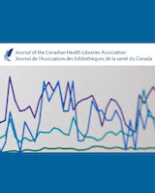
Journal of the Canadian Health Libraries Association
Scope & Guideline
Connecting researchers and practitioners for a healthier tomorrow.
Introduction
Aims and Scopes
- Health Library Services and Innovations:
Explores novel approaches and technologies that improve library services in health settings, including virtual services and innovative resource management. - Information Literacy and Education:
Focuses on developing and promoting information literacy skills among health professionals and students, including the integration of information literacy in health sciences education. - Diversity, Equity, and Inclusion (DEI):
Addresses the importance of DEI in health librarianship, seeking to understand and meet the diverse needs of library users and professionals in health contexts. - Research Support and Evidence Synthesis:
Covers the role of librarians in supporting systematic reviews, knowledge synthesis, and research methodologies in health sciences. - Professional Development and Leadership:
Highlights initiatives aimed at leadership development and continuing education for health librarians, ensuring they are equipped to meet evolving challenges.
Trending and Emerging
- Post-Pandemic Library Services:
A significant trend is the adaptation of library services in the wake of the COVID-19 pandemic, emphasizing flexibility and innovation in service delivery. - Quality Improvement Projects:
There is an emerging focus on quality improvement initiatives, particularly in instructional practices within health libraries, indicating a commitment to enhancing user engagement and learning outcomes. - Equity and Diversity Assessments:
Increasing attention is being paid to understanding and addressing equity and diversity needs within health library services, reflecting broader societal shifts towards inclusivity. - Data-Driven Decision Making:
An emerging theme is the use of data analytics and evidence-based practices in library management, showcasing a trend towards more strategic and informed decision-making. - Collaboration and Community Engagement:
There is a growing emphasis on collaborative practices among health librarians, fostering partnerships that enhance resource sharing and community engagement.
Declining or Waning
- Traditional Library Spaces:
The emphasis on physical library spaces has diminished, reflecting a broader trend towards virtual libraries and remote services, especially post-pandemic. - Historical Perspectives on Librarianship:
Recent publications show a declining interest in historical analyses of medical libraries and librarianship, as contemporary practices and innovations take priority. - Predatory Journals:
The topic of predatory journals, once a significant concern, appears less frequently, suggesting a potential shift in focus towards more pressing contemporary issues in health information.
Similar Journals
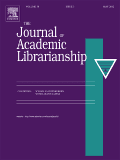
JOURNAL OF ACADEMIC LIBRARIANSHIP
Exploring Trends that Transform Libraries.JOURNAL OF ACADEMIC LIBRARIANSHIP, published by Elsevier Science Inc, stands as a premier platform for the academic library community, dedicated to advancing research and innovation in library and information sciences. With an impressive impact factor and recognized in the Q1 category for both Education and Library and Information Sciences, this journal is essential for scholars and practitioners seeking to stay abreast of the latest trends and developments in the field. Since its inception in 1988, it has fostered a vibrant dialogue through peer-reviewed articles, case studies, and empirical research, making significant contributions to the understanding of academic librarianship practices and policies. Although not an open-access journal, its robust distribution and visibility through Elsevier's extensive network ensure wide accessibility to its critical insights. With rankings in the 83rd percentile in both Education and Library and Information Sciences, JOURNAL OF ACADEMIC LIBRARIANSHIP continues to shape the future of the profession by engaging a diverse audience of researchers, educators, and students, thereby reinforcing its position as a cornerstone of scholarly communication in the information sector.

Turkish Librarianship
Advancing Knowledge in Library ScienceTurkish Librarianship is a distinguished open-access journal published by the Turkish Librarians Association, dedicated to the scholarly examination of library and information science. Since its inception in 1987, the journal has played a vital role in promoting research, innovative practices, and knowledge sharing within the field. By providing a platform for academics, practitioners, and students, Turkish Librarianship facilitates discussions that intersect with current trends and challenges in librarianship both locally and globally. The journal draws attention to various aspects of information management, preservation practices, digital libraries, and the evolving role of librarians in a rapidly changing landscape. With an ISSN of 1300-0039 and an E-ISSN of 2147-9682, the journal aims to enrich the academic discourse and serve as a pivotal resource for those engaged in library sciences, ensuring accessibility through its open-access model. This commitment to free dissemination of knowledge not only enhances the journal’s visibility but also underscores its significance in fostering collaborative research and development in the area.

Investigacion Bibliotecologica
Fostering Collaboration in the Heart of Information StudiesInvestigacion Bibliotecologica, published by the National Autonomous University of Mexico, stands as a vital resource in the field of library and information sciences. With a legacy of open access publishing since 1986, this journal endeavors to disseminate high-quality research which aims to advance knowledge and practices within the library and information sector. With an ISSN of 0187-358X and E-ISSN 2448-8321, it has secured its position in the competitive landscape of scholarly communication, earning a commendable Q3 ranking in its category as of 2023. The journal's influence is reflected in its Scopus ranking within the library and information sciences field, where it ranks #151 among 280 journals. Located in Mexico City, it provides scholars, professionals, and students with open access to its content, facilitating knowledge sharing and academic collaboration. As it continues its publication journey from 2008 to 2024, Investigacion Bibliotecologica remains an essential platform for innovative inquiries, practical insights, and the latest developments in library science.
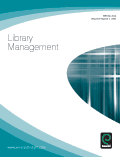
Library Management
Elevating Library Services Through Evidence-Based ResearchLibrary Management, published by Emerald Group Publishing Ltd, is an esteemed academic journal dedicated to the field of Library and Information Sciences. Since its inception in 1979, the journal has continued to be a vital resource for researchers, scholars, and practitioners interested in the evolving practices of library management, information organization, and the role of libraries in the digital age. With an impressive Q1 ranking in the Library and Information Sciences category and a strong performance in Scopus metrics (ranked #85 out of 280), Library Management offers innovative insights and evidence-based research that aim to enhance library services and management practices globally. As an essential contributor to the academic and professional landscape, the journal's objectives include promoting scholarly discourse, fostering best practices, and providing a platform for cutting-edge research that addresses current challenges and opportunities in library management. Researchers and professionals in the field can access a wealth of knowledge without open access barriers, ensuring that the latest findings are available to those dedicated to advancing the discipline.
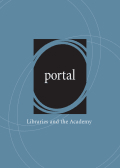
PORTAL-LIBRARIES AND THE ACADEMY
Advancing Knowledge at the Intersection of Information and EducationPORTAL: Libraries and the Academy is an esteemed academic journal published by Johns Hopkins University Press, focusing on the intersection of library and information science, academic practice, and scholarly communication. With an ISSN of 1531-2542 and an E-ISSN of 1530-7131, this journal offers rigorous peer-reviewed research essential for librarians, researchers, and information professionals committed to enhancing academic libraries and fostering innovative practices in higher education. It holds a strong position in its field, ranking in the 61st percentile within Social Sciences and Library and Information Sciences, and categorized as Q2 in both Development and Library and Information Sciences for 2023. Though the journal is not Open Access, its content is invaluable for anyone interested in staying abreast of the latest trends and challenges in library services and academic environments. Since its inception in 2001, PORTAL has continuously contributed to the discourse on the evolving role of libraries in academia, making it a critical resource for those striving to bridge the gap between information access and higher education pedagogy.
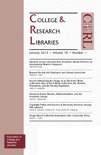
COLLEGE & RESEARCH LIBRARIES
Pioneering Discussions in Library EffectivenessCOLLEGE & RESEARCH LIBRARIES, published by the Association of College & Research Libraries, stands as a pivotal platform in the field of Library and Information Sciences. With an impressive Q1 ranking and a Scopus rank of 78 out of 280, it sits in the 72nd percentile among its peers, reflecting its significant contribution to academic scholarship. The journal, in circulation since 1939 and with *Open Access* status since its inception, is committed to disseminating high-quality research and practical insights for librarians, information professionals, and researchers. Based in the heart of Chicago, the journal provides a comprehensive overview of trends, challenges, and innovations within the library and information sector. Covering a broad spectrum of topics with converged years reflecting a rich historical context (from 1946 to 1947 and from 1987 to 2024), it facilitates discourse among practitioners and scholars aiming to advance the effectiveness of library services. Whether you are a researcher seeking to explore new methodologies or a student striving to stay informed of the latest industry developments, COLLEGE & RESEARCH LIBRARIES is your essential resource.

Evidence Based Library and Information Practice
Advancing evidence-based practices in library and information sciences.Evidence Based Library and Information Practice is a premier open-access journal published by the University of Alberta, Canada, since 2006. With a firm commitment to advancing research in the Library and Information Sciences, this journal provides a platform for the dissemination of innovative practices and empirical studies that inform library and information services globally. Recognized in 2023 with a Q3 category rating within its field, it ranks 169 out of 280 in the Scopus database, reflecting its growing influence and relevance. The journal’s objective is to bridge the gap between theory and practical applications, making it an essential resource for librarians, scholars, and students who seek evidence-based insights to enhance library practices and information management. By facilitating open access to high-quality research, Evidence Based Library and Information Practice plays a crucial role in fostering an informed academic community.
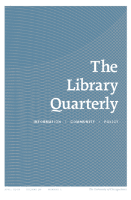
LIBRARY QUARTERLY
Uncovering Innovative Practices in LibrariesLIBRARY QUARTERLY, published by University of Chicago Press, stands as a premier academic journal in the field of Library and Information Sciences. With an ISSN of 0024-2519 and an E-ISSN of 1549-652X, this journal has been a vital source of scholarship since its inception in 1946. Positioned in the Q1 category for its field, it ranks #79 out of 280 in Scopus, reflecting its significant influence and quality as recognized by the academic community. Although it does not offer open access, LIBRARY QUARTERLY provides an indispensable platform for research and discourse on library practices, information management, and related technologies. Its scope encompasses a wide range of topics pertinent to both traditional and emerging issues within libraries, serving as an essential resource for researchers, professionals, and students alike. By engaging with this journal, readers gain access to cutting-edge research that shapes the future of library science and inspires innovative practices within the field.

LIBRARY JOURNAL
Advancing Library Practices for a Digital EraLIBRARY JOURNAL, published by REED BUSINESS INFORMATION, is a vital periodical in the field of Library and Information Sciences, providing a rich resource for researchers, professionals, and students alike. With a history spanning from 1945 to its recent issues, this journal captures the evolving landscape of library science, offering insightful articles that address current trends, practices, and challenges within the profession. Although not an open access journal, LIBRARY JOURNAL is highly regarded for its content, which reflects the challenges faced by libraries and the critical role they play in education and community services. Despite its Scopus ranking of 159 out of 210, the journal continues to contribute significantly to discussions around information management, bibliometrics, and digital libraries, making it an essential read for those invested in the ongoing development of library services and information literacy in the digital age.

DESIDOC Journal of Library & Information Technology
Connecting Global Scholars in Library and Information ScienceDESIDOC Journal of Library & Information Technology, published by the Defence Scientific Information Documentation Centre, is a pivotal scholarly platform in the realm of Library and Information Sciences. The journal, indexed with ISSN 0974-0643 and E-ISSN 0976-4658, has established its reputation with a commendable Q3 category ranking in the latest Scopus quartiles and a notable rank of 113 out of 280 in its field, placing it in the 59th percentile. Engaging a global audience, it disseminates high-quality research insights aimed at advancing the practices and technologies within library and information management. Operating within a converged timeframe from 2012 to 2024, the journal is committed to fostering robust discussions surrounding contemporary issues in the field, making it an invaluable resource for researchers, professionals, and students alike. While currently not offering open access, its content is accessible through institutional subscriptions, reinforcing its significance in the academic community of India and beyond.